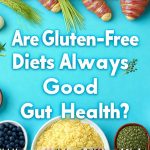The pursuit of wellness has led many down paths focused on dietary restriction and “clean eating.” What began as a desire for healthier choices can sometimes morph into an overly restrictive approach, inadvertently impacting the very ecosystem within us that supports good health: our gut microbiome. The idea of eliminating processed foods, sugar, gluten, dairy, or entire food groups often feels empowering – a proactive step toward better wellbeing. However, the nuance lies in recognizing that extreme clean eating can be as detrimental to gut health as a consistently poor diet. This is because a diverse and thriving gut microbiome requires variety, including fiber from a wide range of plant sources, but also some exposure to microbes encountered through less-processed foods, and even carefully considered indulgences.
The modern obsession with eliminating anything perceived as “unclean” can unintentionally starve beneficial bacteria in the gut. Our digestive systems evolved over millennia alongside diverse food sources, building resilience through exposure to a spectrum of microorganisms. When we drastically limit our diet, we reduce the fuel available for these microbial communities, potentially leading to dysbiosis – an imbalance in the gut microbiome associated with various health concerns. It’s not necessarily about avoiding healthy foods; it’s about finding balance and recognizing that perfection isn’t always synonymous with optimal health. A truly healthy diet supports a diverse and resilient gut, rather than one depleted by excessive restriction. You might even find yourself needing to train your gut to adjust!
The Paradox of Purity: When Clean Eating Goes Too Far
Clean eating, at its core, is commendable. It encourages mindful consumption and prioritizes whole, unprocessed foods – something everyone can benefit from. However, the line between healthy diligence and harmful rigidity can be surprisingly thin. This is especially true when “clean” becomes synonymous with “limited.” A diet overly focused on eliminating potential irritants or perceived toxins can inadvertently diminish microbial diversity. Think about it: each food provides a different type of fiber, prebiotic compounds, and even trace elements that feed specific bacteria in your gut. By drastically reducing the variety of foods you consume, you’re effectively limiting the resources available to these bacterial populations.
The problem isn’t necessarily with avoiding certain foods if you have diagnosed sensitivities or allergies. It’s when this avoidance extends beyond genuine medical necessity and becomes a blanket rule applied to everyone. For example, eliminating gluten without celiac disease or non-celiac gluten sensitivity can remove valuable prebiotic fibers that support gut health. Similarly, completely cutting out dairy, even if not lactose intolerant, might eliminate beneficial bacteria that thrive on the compounds found in milk products. A healthy gut needs a diverse ecosystem, and diversity thrives on variety. This doesn’t mean you should eat everything; it means carefully considering the impact of restrictions beyond what is medically required. If you experience issues with your diet, making space for healing can be incredibly helpful.
Furthermore, an overly restrictive diet can increase anxiety around food, leading to disordered eating patterns and a strained relationship with nourishment. Stress, ironically, has a significant negative impact on gut health, creating a vicious cycle where dietary restriction contributes to stress, which then further disrupts the microbiome. The goal should be sustainable healthy habits, not fear-based restrictions. A balanced approach that allows for occasional “less clean” choices can actually promote psychological wellbeing and reduce overall stress levels, ultimately benefiting gut health in the long run. It’s worth considering if supplements could be contributing to your digestive issues as well.
Understanding Gut Microbiome Diversity
Gut microbiome diversity refers to the sheer number of different species of bacteria residing in your digestive tract. It’s a crucial indicator of a healthy gut ecosystem. A diverse microbiome is more resilient – better equipped to withstand disruptions like antibiotics, stress, or dietary changes – and plays a vital role in numerous bodily functions beyond digestion. These include immune system regulation, mental health, nutrient absorption, and even hormone production.
- Higher diversity generally correlates with improved health outcomes.
- Lack of diversity is linked to increased risk of chronic diseases such as inflammatory bowel disease (IBD), obesity, type 2 diabetes, and autoimmune conditions.
- Dietary restriction is a significant contributor to reduced microbial diversity.
The relationship between diet and gut microbiome composition is bidirectional. What you eat directly influences the types of bacteria that thrive in your gut, and those bacteria, in turn, influence how your body processes food and responds to different stimuli. When we limit our dietary intake, we starve certain bacterial populations while allowing others to flourish – often leading to an imbalance. Introducing a wide variety of plant-based foods is one of the most effective ways to foster diversity. Different fibers feed different bacteria; therefore, eating a rainbow of fruits, vegetables, whole grains, and legumes provides a broader spectrum of nourishment for your gut ecosystem. Knowing signs of poor diet can help you identify imbalances.
The Role of Prebiotics & Fermented Foods
Prebiotics are essentially food for probiotics – the beneficial bacteria in your gut. They’re types of fiber that humans can’t digest but microbes readily ferment, producing short-chain fatty acids (SCFAs) which have numerous health benefits. Sources include onions, garlic, leeks, asparagus, bananas, oats, and apples. Incorporating a variety of prebiotic-rich foods into your diet is a powerful way to nourish your gut microbiome without resorting to restrictive practices. Think about it: instead of removing foods, you’re actively adding nutrients that promote microbial growth.
Fermented foods are another excellent source of probiotics – live microorganisms that can directly colonize the gut and contribute to its diversity. Examples include yogurt (with live cultures), kefir, sauerkraut, kimchi, kombucha, and miso. However, it’s important to note that probiotic supplements aren’t always necessary or effective for everyone. A naturally fermented diet provides a more sustainable and nuanced approach to introducing beneficial bacteria into the gut. Be mindful of seed oils as well, as they can impact your gut health.
Reintroducing Foods: A Gradual Approach
If you’ve been following a highly restrictive “clean eating” diet, reintroducing foods can feel daunting but is crucial for restoring gut health. The key is gradualism and mindful observation of your body’s response. Don’t attempt to reintroduce everything at once; start with small portions of one food group at a time, carefully monitoring for any symptoms like bloating, gas, or changes in bowel habits.
- Start Small: Begin with foods that are generally well-tolerated and less likely to cause irritation, such as gluten-free grains or lactose-reduced dairy products (if applicable).
- Keep a Food Diary: Record what you eat, how much, and any symptoms you experience. This will help identify potential triggers.
- Listen to Your Body: Pay attention to your gut’s signals. If a food causes discomfort, don’t force it. Try reintroducing it again later in smaller quantities.
- Focus on Variety: As you gradually reintroduce foods, prioritize diversity. Aim for a wide range of plant-based options to support a healthy and resilient microbiome.
Remember that gut health is a journey, not a destination. There will be ups and downs along the way. The goal isn’t to achieve perfect elimination but to cultivate a balanced and thriving ecosystem within your digestive tract – one that supports overall wellbeing and resilience. A flexible and nuanced approach to diet is far more sustainable and beneficial than rigid restriction. If you’re experiencing inflammation, knowing what to eat can provide relief.


















